Is it possible to break free of the past? Or is the architecture of one’s life indelibly designed by one’s origins?
Romanian-born Montrealer Felicia Mihali sparks such questions with A Ramshackle Home, the first of her eleven books, given a new life thanks to Judith Weisz Woodsworth’s translation of Le Pays du fromage (2002). This is the book’s third incarnation since it was originally written in Romanian and translated into French by the multilingual author.
In Mihali’s disquieting debut novel, a thirty-year-old woman leaves her apartment in Bucharest after splitting with her husband. She returns with her little boy to her deceased parents’ and grandparents’ “dying village” in the countryside, where “you could spend entire days without running into another living soul.”
A Ramshackle Home Linda Leith Publishing
Felicia Mihali
Translated by Judith Weisz Woodsworth
$22.95
paper
246pp
9781773901435
Chapters are named after months, calling attention to life’s inescapable cycles and to how the seasons shape survival when one is dependent upon the land. It’s June when the young woman settles into her family’s run-down, abandoned home, a time when grapevines are in full bloom and the garden, “like a fragrant paradise,” forecasts fertility. Over the summer, George and Ilie, old childhood friends, come to play out unfinished love stories, interrupting her grief and solitude. Yet bound by old patterns, she’s unable to return George’s generosity, even as he bends over backwards to help out. Instead, she remains stuck on Ilie, a handsome womanizer she’s desired since girlhood.
Olfactory memory continually compromises any efforts to forget family history. When Aunt Joana, who “still kept two goats and three sheep,” drops by in August with provisions, the narrator recounts how, as a child, she avoided the “foul-smelling platter” of cheese at the dinner table: “My mother thought that I might be sick because I rejected this mythical food, which had saved our people from famine so often but which didn’t agree with me.”
Devoid of nostalgia, the young woman continues to reject her roots, numbing out as the cold sets in: “I didn’t want to come from here. I didn’t want to have the parents that I had. I didn’t want my past to smell of alcohol and cheese.”
When fall and winter become unbearable, she escapes into fantasy and dreams, reimagining violent ancestral memories and infusing her own story with ancient mythology. As the narrative zigzags in and out of the Trojan War, readers take in age-old power struggles between men and women. Here, the protagonist experiences herself as Priam’s beautiful daughter, Zenaida, captured by Achilles, “for whom I was the vulnerable heel.”
As the months come full circle and then slide back into rainy fall, the author only turns up the volume on her protagonist’s negative self-talk. Anyone drawn to Hollywood endings will not find one here. Yet those who prefer less sanitized studies will appreciate this penetrating portrait of a young woman stripped of propriety and burdened by transgenerational trauma.
Throughout, Mihali skillfully pairs the exquisite with the repellent, arresting the reader with vivid descriptions that engage all the senses. She delivers scenes at once raw with despair and rich with symbolism, clearly broadcasting the complexes of her main character. Witnessing the crumbling of her ramshackle home, the reader is rocked by this young woman’s underlying framework, uncovered and conveyed with shattering honesty.mRb






0 Comments